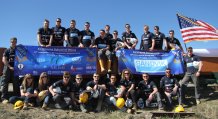
This year’s prestigious international mining games competition took place in Montana, USA
Students strike gold at International Mining Games
Students from the Camborne School of Mines (CSM) are celebrating after winning three gold medals, two silver and a bronze in this year’s prestigious international mining games competition which took place in Montana in the USA.
Twenty students in three teams from the mining school based at the University of Exeter’s Penryn campus took part in the 38th International Intercollegiate Mining Games, competing with teams from across the globe in arduous mining events designed to put traditional mining skills to the test.
The Co-ed team came third overall in its division and secured gold in the ‘mucking’ and ‘track stand’ events and silver in ‘swede saw’. The Men’s A team secured top spot in the ‘mucking event’, which involves running a one tonne ore wagon down a 75’ track and filling it as quickly as possible - the third successive year the team have been crowned world ‘mucking’ champions. The team also came second in the ‘track stand’ event, which involves setting up and tearing down a section of rail track.
The CSM teams, who received support from the Camborne School of Mines Trust, were the only UK representatives taking part at the three-day event.
Mining games captain Liam Norwood said: “The games provide an excellent opportunity to meet fellow mining students from around the world and wave the CSM flag at an internationally renowned event. We compete in front of an industry related audience of over 1000 in numbers.
“Our team is extremely excited to host the 40th year of the Games in 2018. A huge thank you is in order to our sponsors, without them we would not be able to represent CSM and gain such valuable experience.”
The international mining games competition started in 1978 as an act of commemoration to the 1972 Sunshine mine disaster that claimed the lives of 91 workers and stands as a reminder to all those who have lost their lives in mining. The primary aim of the competition is to keep the traditional mining techniques alive, many of which were developed in Cornwall
Date: 13 April 2016
